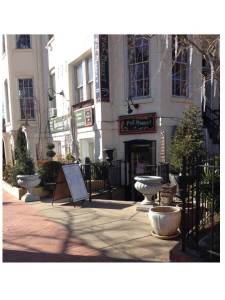In many DC neighborhoods, corner stores provide easier access to many daily needs, such as a quart of milk, pharmacy goods, food stuffs, or a coffee. A corner store is a small, neighborhood-based retail establishment tucked into a predominantly residential neighborhood.
The convenience of corner stores is important for many residents of the city. These shops can help to create a better sense of community and provide better access to goods for residents who do not have the means, the time, or the desire to get to a commercial street. Many of our older rowhouse areas were constructed with the corner store as part of the neighborhood fabric.
Even so, the zoning regulations have become more restrictive over time, and many corner stores have been lost or have been required to go through lengthy approval process to remain open or to upgrade to stay current with the needs of current neighborhood residents. Under the current zoning regulations, no new retail uses are permitted in our low density residential zones, and where they exist, they can be difficult to be retained or updated.
But help is on the way. The Zoning Commission has now taken proposed action to approve a series of changes to the regulations governing corner stores. Under the proposed zoning regulations, providing new corner stores and maintaining existing ones could be easier in District rowhouse neighborhoods.
In the proposed Regulations, subject to certain conditions, corner stores would be permitted in R-3 and R-4 rowhouse zones. A corner store, however, would continue to be not permitted in the lower density neighborhoods (R-1 and R-2, characterized by single-family detached or semi-detached homes), or the apartment zones.
The proposed regulations would govern the type of uses that could be called a corner store, and would include food stores, arts uses, and general retail or service. Eating and drinking establishments would be permitted, but limited – food could be prepared or assembled, but not cooked, and no alcohol could be consumed on-premises. The area of a corner grocery store devoted to the sale of beer or wine for off-site use would be limited to 15% of the floor area, and only if approved by the Board of Zoning Adjustment (BZA) by special exception.
The location of new corner store would also be limited to corner lots – a lot at the intersection of two streets, where they have traditionally been located in rowhouse neighborhoods. The property would have to be at least 500 feet from the nearest commercial zone, with the idea being that we don’t want new stores to take away from the vitality of commercial districts. And finally in regard to location, the concentration of these uses would be limited in order to maintain the overall residential character of the neighborhoods in which they are located.
Most new corner stores would not be permitted by-right – a new store would typically require a special exception, meaning BZA and neighborhood review of potential impacts and a demonstration that the use would enhance the pedestrian environment of the residential character of the neighborhood. The BZA would also examine items like number of employees, hours of operation, garbage collection, and landscape and building design. However, an existing store could be maintained or changed to meet current demands without requiring BZA approval. And a corner grocery store would be allowed as a matter-of-right, as long as it includes the sale of general food merchandise and fresh perishable foods. A corner grocery store not meeting those requirements would be subject to a special exception review.
The maximum floor area for a corner store would be 1,200 square feet, not counting the cellar. – This is smaller than a typical Starbucks and less than half the size of a typical 7-11, so it is unlikely we would see those kinds of businesses, but the size is consistent with most existing “mom and pop” corner stores in our rowhouse areas. The corner store use would be limited to the ground floor and cellar or basement. In order to maintain a compatible level of density in the neighborhood, the corner store could only have one residential unit on the same lot.
For residents of existing rowhouse areas of the District, the potential for a corner store would be an added amenity and would increase the walkability of their neighborhoods. For full details of the proposed corner store regulations, see Subtitle U § 254.


You are commenting using your Google+ account. ( Log Out / Change )
Connecting to %s